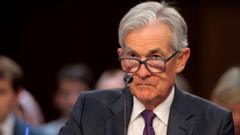The Fed Chair Tussle: A Historical Perspective on Presidential Influence
 The Tech Times
The Tech Times
In a rare move that has stirred the financial and political worlds alike, former U.S. President Donald Trump openly considered the firing of Federal Reserve Chair Jerome Powell. Although Trump later stated it was "highly unlikely" he would proceed, the mere suggestion raised eyebrows and evoked historical echoes of presidential influence over the ostensibly independent Federal Reserve.
A Brief History of the Federal Reserve's Independence
The Federal Reserve, the central bank of the United States, was established in 1913 to provide the nation with a safer, more flexible, and more stable monetary and financial system. Over the years, its role has evolved significantly, with its primary objectives currently being maximum employment, stable prices, and moderate long-term interest rates.
Central to the Fed's operation is its independence from political influence, a principle that has been tested on multiple occasions. Historically, this autonomy is intended to shield monetary policy from short-term political pressures and to promote decisions that benefit the economy in the long run.
Presidential Influence: Not a New Phenomenon
While Trump's contemplation of Powell's dismissal appears unprecedented, it's not the first time a U.S. president has attempted to influence the Federal Reserve. One notable example is President Richard Nixon, who in the early 1970s exerted pressure on then Fed Chair Arthur Burns to maintain low interest rates to bolster his re-election prospects. This political interference is often cited as a contributing factor to the high inflation of the 1970s.
Similarly, in the 1960s, President Lyndon B. Johnson reportedly physically coerced Fed Chair William McChesney Martin to keep rates low to fund the Vietnam War and the Great Society programs. These instances underscore the tension between political ambitions and central bank independence.
The Powell-Trump Saga
Jerome Powell, appointed by Trump, has been serving as Fed Chair since February 2018. The relationship between Trump and Powell has been fraught, primarily due to Powell's decisions to incrementally raise interest rates, a move Trump argued was detrimental to economic growth. Trump's public criticisms of Powell were unprecedented in their frequency and intensity, leading to market unrest and raising concerns about the Fed's independence.
The mere discussion of Powell's potential dismissal marks a pivotal moment in the ongoing narrative of presidential influence over the Federal Reserve. It highlights the delicate balance between political interests and the central bank's duty to make decisions based on economic, not political, criteria.
The Implications of Undermining Fed Independence
The independence of the Federal Reserve is crucial for maintaining market confidence and ensuring sound monetary policy. Any perception of undue influence from the executive branch can lead to volatility and a loss of credibility, both domestically and internationally. Investors seek stability and predictability, and any indication that the Fed is swayed by political considerations could lead to adverse economic consequences.
Furthermore, such actions could set a dangerous precedent, encouraging future administrations to exert similar pressures, thereby eroding the autonomy that is vital for the Fed's effective functioning.
Conclusion: A Call for Respecting Institutional Boundaries
The episode with Trump and Powell serves as a stark reminder of the importance of maintaining the Federal Reserve's independence. While the president's concerns about economic policies are understandable, the mechanisms for addressing them should respect the boundaries that safeguard institutional integrity.
As history has shown, the consequences of meddling in monetary policy can be profound and far-reaching. It is imperative that such institutions remain insulated from political machinations to ensure the continued stability and prosperity of the economy. The lessons from past episodes should guide future interactions between the presidency and the Federal Reserve, maintaining a clear separation that benefits all.
Source: Trump says he discussed firing Fed chair but 'highly unlikely' he will
Subscribe to my newsletter
Read articles from The Tech Times directly inside your inbox. Subscribe to the newsletter, and don't miss out.
Written by
